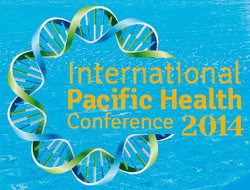Pacific health researchers and practitioners from New Zealand and around the world will gather in Auckland next week to discuss effective ways to tackle the health challenges facing Pacific peoples.
Some 250 people are expected to attend the International Pacific Health Conference 2014 at the Rendezvous Grand Hotel in Auckland on 3–5 November, with nearly 100 speakers from New Zealand, Australia, the Pacific Islands, United States and beyond presenting their research findings.
The conference, which is hosted by the Health Research Council of New Zealand (HRC), will focus on some of the key issues facing Pacific peoples at a global level, including the high incidence, prevalence and economic cost associated with non-communicable diseases such as obesity; the high chronic disease burden, particularly cardiovascular disease and type 2 diabetes; the growing health inequities in the Pacific region; and the greater prevalence of mental health disorders, suicide attempts, tobacco and alcohol use among Pacific youth.
Keynote speakers include the highly regarded leader and expert in Māori health, education and indigenous development, Professor Sir Mason Durie, KNZM, and Chair of Native Hawaiian Health at the John A. Burns School of Medicine at the University of Hawai‘i at Mānoa, Professor Keawe‘aimoku Kaholokula.
HRC Project Manager, Pacific Health, Dr Nuhisifa Seve-Williams says the conference is a great opportunity for interdisciplinary dissemination of health research, practice and knowledge.
“Pacific health research helps to build the capacity and capability of Pacific peoples in research and contributes to the Pacific knowledge base. We see through conferences such as this that Pacific health research and practice at the global level is moving in new and strategic directions, which will ultimately help to improve the health and well-being of Pacific peoples globally.”
The following is a selection of some of the abstract presentations that will feature at the conference:
- Dr Ofa Dewes (University of Auckland) will report on the findings of her study that created a Pacific approach to weight management based on the New Zealand weight management guidelines, and incorporated it into three churches (Samoan, Tongan, Fijian) in Auckland.
- In New Zealand, Pacific mothers have a high rate of unplanned pregnancies. Ms Marianna Churchward (Victoria University of Wellington) will explore her doctoral research into pregnancy planning and contraceptive use among first-time Samoan mothers living in New Zealand.
- Evidence shows that Pacific peoples have higher rates of suicidal thought, suicide plans and suicide attempts than all other ethnic groups in New Zealand. Dr Jemaima Tiatia-Seath (University of Auckland) will describe her study ‘Suicide prevention for Tongan youth in New Zealand’, which aims to reduce suicidal behaviours for Tongan and other Pacific youth in New Zealand.
- Ms Amio Ikihele and Ms Mary Roberts (University of Auckland) will introduce the new Tapuaki smartphone app and website that they have developed to allow Pacific mothers and members of their families to find information leading up to, during and post-pregnancy – the first of its kind for Pacific peoples in New Zealand.
- Dr Melissa Stoneham (Public Health Advocacy Institute, Western Australia) will discuss the implications of the negative portrayal of Aboriginal health in the media. She will also explore strategies for public health practitioners, journalists, and media practitioners to enable them to positively influence the way in which Australian Aboriginal peoples are portrayed in the media.
- As many as one in two patients with cardiovascular disease have a mental illness, with recent studies suggesting that mood disorders are the most common. Dr Joy Andrade (John A. Burns School of Medicine, University of Hawai‘i, United States) will describe her study, which explores whether there is an association between depression and heart disease for an ethnically diverse sample of Native Hawaiians, Pacific Islanders and Asian Americans.
Go to http://pacificconference.hrc.govt.nz/programme to view the full programme of abstract presentations.
HRC Board Chair Sir Robert Stewart, KNZM, who will open the conference, says the HRC has a special interest in Pacific health research.
“We are working to improve health equity in New Zealand by investing in emerging Pacific health researchers who are best placed to identify and resolve health issues in their communities. It’s fantastic to see that so many of these researchers will be presenting at the conference.”
The International Pacific Health Conference 2014 has been made possible through the generous support of its sponsors, Auckland Council and the Health Promotion Agency, and partners: the Ministry of Health; Secretariat of the Pacific Community; Institute for Social Research at the University of Michigan; AUT University Pacific Islands Families Study; the University of Otago; John A. Burns School of Medicine, University of Hawai‘i at Mānoa; Le Va; Ministry of Social Development Pasefika Proud; the University of Auckland; AUT University; and the Pasifika Medical Association.
